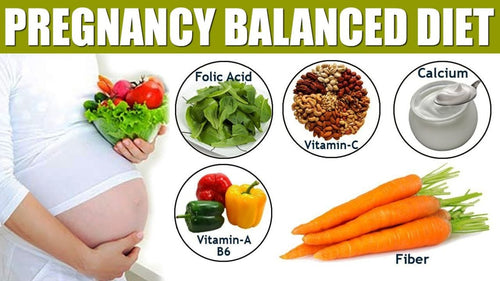How Much Should You Gain
Your pregnancy BMI (Body Mass Index) determines your weight gain recommendations. Your BMI is calculated by multiplying your weight in pounds by 703, then dividing by your height in inches squared. Or you can download a BMI app and do the calculations. You can search "adult BMI calculator" at cdc.gov, or use the chart below.
Gain Weight Safely
Eating a heathy, balanced diet will help your baby get the nutrients they need and grow at a healthy rate. You may wonder how many extra calories you need. Yes, you do need extra calories, but you don't need to necessarily "eat for two".
The average pregnant woman will need about 300 healthy calories more a day than they did before they were pregnant. Ask your health care provider how much weight you should gain. A woman who was average weight before becoming pregnant should gain 25 to 35 pounds after becoming pregnant. A woman who was underweight should gain 28 to 40 pounds, and overweight women may only need to gain 15 to 25 pounds during their pregnancy.
If you are expecting twins, you should gain 35 to 45 pounds during pregnancy. Because twins are often born early, a higher weight is important for their health. So it is important to gain the right amount because your weight affects the babies weight.


Where Does the Extra Weight Go During Pregnancy
- Baby: 8 pounds
- Placenta: 2-3 pounds
- Amniotic Fluid: 2-3 pounds
- Breast tissue: 2-3 pounds
- Blood Supply: 4 pounds
- Stored fat for delivery and breastfeeding: 5-9 pounds
- Larger Uterus: 2-5 pounds
- Total: 25-35 pounds
Is It Safe to Lose Weight When Pregnant?
A doctor may want a woman who is very overweight when they become pregnant to lose weight. this should only occur under a doctor's care. In most cases, woman should not try to lose weight or diet during pregnancy.

How to Gain the Right Amount of Weight During Pregnancy
Try these tips if your health care provider wants you to gain weight during your pregnancy.
- Eat five to six small meals every day
- Keep quick, easy snacks on hand, like nuts, raisins, dried fruit, cheese and crackers, yogurt or ice cream.
- Spread peanut butter on toast, crackers, apples, bananas, or celery, One teaspoon of creamy peanut butter gives you about 100 calories and 7 grams of protein.
- Add nonfat powered milk to mashed potatoes, scrambled eggs, and hot cereal.
- Add extras to your meal, like butter or margarine, cream cheese, gravy, sour cream, and cheese.
What if You Gain Too Much Weight During Pregnancy?
If you have gained more weight during your pregnancy than your doctor recommended, talk to your doctor about it. You will want to wait until after delivery to lose weight, in most cases. Here are some tips to slow your weight gain:
- When eating fast food, order lower-fat items such as broiled chicken breast sandwich with tomato and lettuce (no sauce or mayonnaise), side salad with low-fat dressing, plain bagels, or a plain baked potato. Avoid foods such as French fries, mozzarella sticks, or breaded chicken patties.
- Avoid whole milk products. You need at least four servings of milk products every day. However, using skim, 1%, or 2% milk will greatly reduce the calories and fat you consume. Also, choose low-fat or fat-free cheese or yogurt.
- Limit sweet or sugary drinks, fruit punch, fruit drinks, soft drinks, iced tea, lemonade, or powdered drink mixes have a lot of empty calories. Drink water, club soda, or mineral water so you can skip extra calories. Do not add salt to any of your food when you are cooking. Salt causes you to retain water. Limit sweets and high-calorie snacks. Candies, cookies, donuts, cakes, honey, syrup, and potato chips have a lot of calories and little nutrition. Try not to eat these foods every day. Instead, you can try eating fresh fruit, low-fat yogurt, angel food cake with strawberries, or pretzels as lower-calorie snack and dessert choices.
- Use fats in moderation, such as cooking oils, margarine, butter, gravy sauces, mayonnaise, regular salad dressing, sauces, lard, sour cream, and cream cheese. Try lower-fat alternatives.
- Fry food in oil or butter will add calories and fat. Baking, broiling, boiling, and grilling are healthier preparation methods.
- Moderate exercise can help burn excess calories. Walking and swimming is usually safe for pregnant women. Talk with your doctor what exercise would be right for you, before you start.

1st Trimester Workouts

2nd Trimester Workouts

3rd Trimester Workouts



When to Call Your Doctor
Talk to your doctor if you:
- Want to know a good target weight for you.
- Think you are gaining too much weight
- Are losing weight during the second or third trimester
- Have an eating disorder that is keeping you from eating a healthy amount of food
- Need help setting a good menu plan to gain a healthy amount of weight.
- Gain weight rapidly. This could be a sign of preeclampsia, pregnancy-related high blood pressure, a serious health issue.
Maternity Bands are a great way to still wear your favorite pants during your pregnancy!
Pregnancy Weight Gain: What's Healthy?
Eating for two doesn't mean you can eat twice as much as usual. Create healthy lifestyle habits to manage your pregnancy weight gain support your baby's health and make it easier for you to shed the extra pounds after delivery.
Pregnancy Weight-Gain Guidelines
When it comes to pregnancy weight gain, there is no one-size fits-all approach. The appropriate weight gain for you depends on various factors, including your pre-pregnancy weight and body mass index (BMI). You and your baby's health also play a role. Work with your health care provider to find what's right for you.
You can consider these guidelines for pregnancy weight gains:
| Pre-pregnancy weight | Recommended weight gain |
|---|---|
| Underweight (BMI under18.5) | 28 to 40 lbs. (about 13 to18 kg) |
| Normal weight (BMI 18.5 to 24.9) | 25 to 35 lbs. (about 11 to 16 kg) |
| Overweight (BMI 25 to 29.9) | 15 to 25 lbs. (about 7 to 11 kg) |
| Obesity (BMI 30 or more) | 11 to 20 lbs. (about 5 to 9 kg) |
Source: Institute of Medicine and National Research Council

When You're Carrying Twins or Other Multiples
If you are carrying twins or other multiples, you'll likely need to gain more weight. Again, work with your health care provider to find what's right for you.
Consider these general guidelines for pregnancy weight gain if you're carrying twins:
| Pre-pregnancy weight | Recommended weight gain |
|---|---|
| Normal weight (BMI 18.5 to 24.9) | 37 to 54 lbs. (about 17 to 25 kg) |
| Overweight (BMI 25 to 29.9) | 31 to 50 lbs. (about 14 to 23 kg) |
| Obesity (BMI 30 or more) | 25 to 42 lbs. (about 11 to 19 kg) |
Source: Institute of Medicine and National Research Council
When You're Overweight
If you are overweight before your pregnancy, there is an increased risk of various pregnancy complications, including gestational diabetes, high blood pressure disorders of pregnancy, such as preeclampsia, and the need for a C-section. Work with your health care provider to determine what's best in your case and to manage your weight throughout pregnancy.


When You're Underweight
If you're underweight before pregnancy, it's essential to gain a reasonable amount of weight, your baby might be born smaller than expected.



When You Gain Too Much
If you gain too much during your pregnancy can increase your baby's risk of health problems, such as being born significantly larger than average (fetal macrosomia). You might also be at increased risk of pregnancy-related hypertension, gestational diabetes, prolonged labor, and the need for a C-section or delivery before your due date. Excessive weight gain during pregnancy can also increase your risk of blood clots in the postpartum period.
Sources:
- Weight Gain During Pregnancy: How Much is Normal?
- Pregnancy Weight Gain: What's Healthy?
Pregnancy Depression
It is normal for every expectant mom to have her difficulties. If your lows are consistent and frequent, you may be among the 10-15 percent of women who battle mild to moderate depression during pregnancy.Both emotional & physical depression shows up in a variety of symptoms, that go well beyond standard moms-to-be moodiness. They can include feeling sad, empty, hopeless, and emotionally lethargic, having sleep disturbances (you don't feel like eating at all, or you're eating all the time), feeling fatigued and lacking energy (above what's normal in pregnancy) and/or feeling agitated or restless, losing interest in work, friends, family, and activities you usually enjoy, losing concentration and focus, having exaggerated mood swings (more dramatic than what's normal in pregnancy), and even having self-destructive thoughts. There may also be unexplained aches and pains.
Nutrition while Breastfeeding
Your nutrition during breastfeeding isn’t affected by your diet unless you’re eating habits are inadequate. You do need to be sure to take in enough calories and water for your body to produce adequate milk. Your baby may react a different way to certain foods, but if you pay attention to how your baby responds, you can figure out what foods to avoid.
Exercising Tips for Pregnant Women
Before starting any type of fitness program, please consult your physician. Let him or her know what type of exercises you plan on doing, and whether they are safe for you.
Teaching Kids to Eat Healthy
If you were to offer your child a candy bar or an apple, which would they choose? What if instead, you offer them the choice between crackers and cheese or an apple? Teaching kids to eat well can be real tricky. You don't want to turn every meal into a lecture, but if you wait too long, they could pickup unhealthy habits in the meantime.










